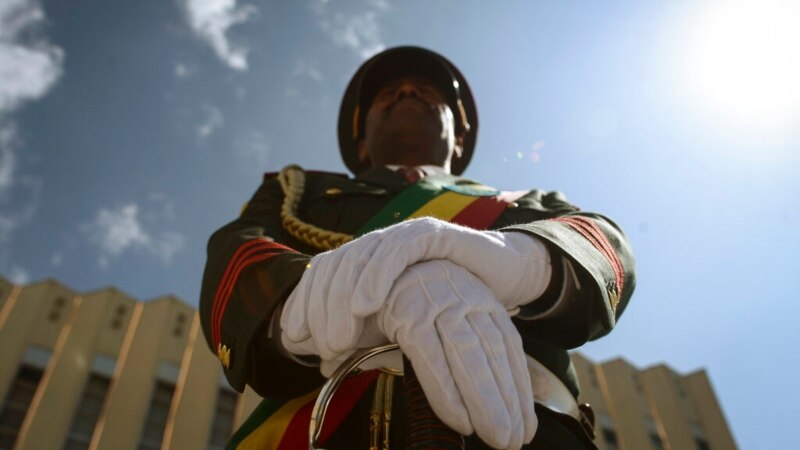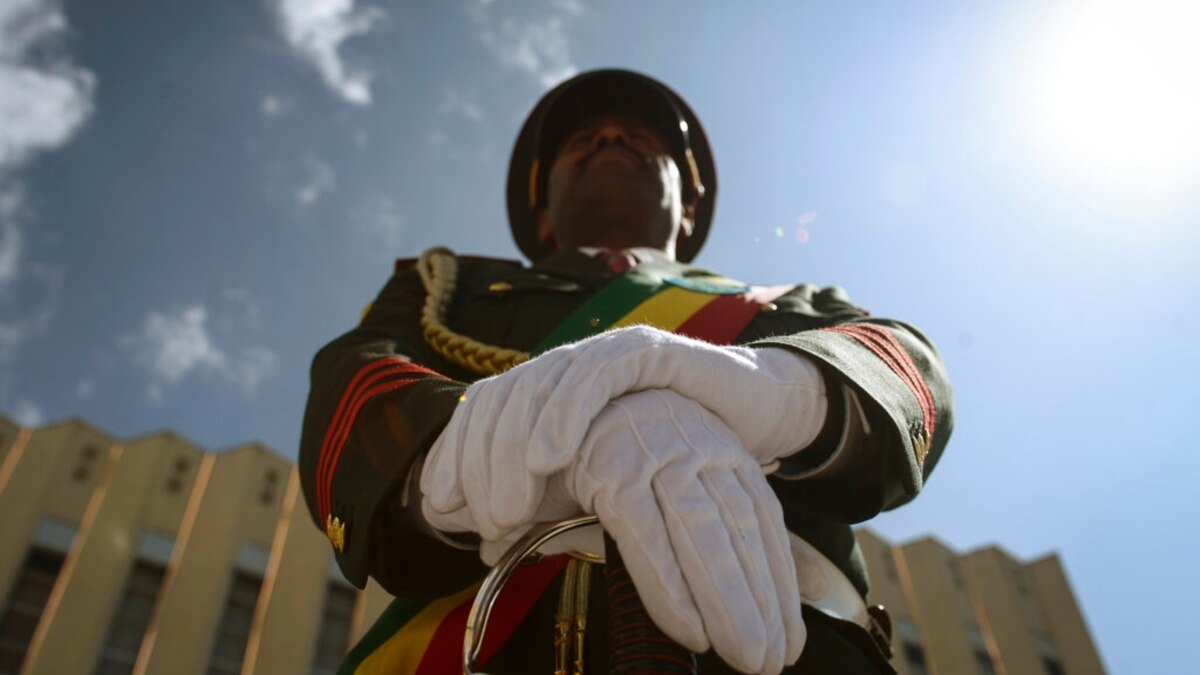This website uses cookies so that we can provide you with the best user experience possible. Cookie information is stored in your browser and performs functions such as recognising you when you return to our website and helping our team to understand which sections of the website you find most interesting and useful.


United Nations —
Editor's note: Here is a fast take on what the international community has been up to this past week, as seen from the United Nations perch.
Warring sides in northern Ethiopia agree to cease-fire
The Federal Government of Ethiopia and the Tigray People’s Liberation Front signed a Permanent Cessation of Hostilities on Wednesday, giving hope to millions that two years of war, displacement and severe hunger could come to an end. The agreement was signed in Pretoria, South Africa. The African Union played a lead role in the negotiations including the high representative for the Horn of Africa, former Nigerian President Olusegun Obasanjo, along with former Kenyan President Uhuru Kenyatta and former Deputy President of South Africa Phumzile Mlambo-Ngcuka (who is also known to U.N. observers for the eight years she led U.N. Women). Secretary-General Antonio Guterres told reporters Thursday at the United Nations that the “human cost to this conflict has been devastating.” He hailed the agreement as “a critical first step” that will open the way for humanitarian access and the resumption of public services.
More shelling at Ukrainian nuclear power plant
Ukraine’s Zaporizhzhia nuclear power plant lost all access to external electricity following overnight shelling Thursday and was receiving backup power from its emergency diesel generators. The International Atomic Energy Agency Director General Rafael Grossi said the development is "extremely concerning" and "again demonstrates the plant's fragile and vulnerable situation." The plant is in Russian-occupied territory. Ukrainian experts continue to operate the facility under the watch of Russian soldiers. The IAEA chief has been working to establish a demilitarized zone around it to lessen chances of a nuclear accident. Separately, Grossi said that his inspectors have so far not found any indications of undeclared nuclear activities and materials at three sites they inspected, following up on Russian allegations that Ukraine is preparing to detonate a “dirty bomb” on its territory.
UN Security Council discusses barrage of DPRK missiles
The U.N. Security Council met Friday afternoon to discuss North Korea’s unprecedented series of missile launches. The United States, with fellow council members Albania, Britain, France, Ireland and Norway called for the meeting following a string of missile launches in recent days. U.S. Ambassador Linda Thomas-Greenfield said North Korea’s behavior was “appalling” and called on council members to be united in responding. Pyongyang has found repeated protection this year in the 15-nation council from China and Russia.
US to press for Iran’s removal from UN Women’s Commission
The United States called on Wednesday for Iran to be removed from the U.N. Commission on the Status of Women (CSW), the main intergovernmental body dedicated to gender equality and the empowerment of women. U.S. Ambassador Linda Thomas-Greenfield said Iran’s membership is an “ugly stain” on the body’s credibility. Iranian security forces have been violently cracking down on women-led peaceful protests since mid-September after 22-year-old Mahsa Amini died in police custody. She was detained by the so-called morality police for wearing her headscarf “improperly.”
In brief
— The secretary-general traveled to Algiers earlier this week, where he told a summit of the League of Arab States on Tuesday that united, the bloc’s leadership can help the region make the most of its “enormous potential” and contribute to global peace and security. Guterres also said peace must advance between Israel and the Palestinians, saying “the occupation must end” and two states living side-by-side in peace and security with Jerusalem as the capital of both remains “our shared goal.”
— World Health Organization officials warned Tuesday that infectious disease outbreaks and malnutrition pose serious health threats to some 8 million Pakistani flood victims. Flood waters are receding, but waterborne diseases including malaria, diarrheal diseases and dengue fever are on the rise in communities struggling to find shelter, clean water and food.
— Floods are also impacting millions in Africa. In the central Sahel, more than 330,000 people in Niger are impacted in all eight regions of the country. The U.N. says since the rain started in July, 195 people have died and more than 200 people have been injured. Some 36,000 houses have collapsed. In neighboring Nigeria, more than 3 million people have been affected by unprecedented floods. Farmland has been damaged by the rising waters, with more than 100,000 hectares of cassava, rice and plantain crops affected. The U.N. fears this will deepen the already alarming food crisis across Nigeria.
— The International Labor Organization warned Monday that multiple economic and political crises, largely triggered by the war in Ukraine and economic disruption in China, are threatening the recovery of the global labor market. The ILO Monitor on the World of Work finds worsening labor market conditions are affecting both employment creation and the quality of jobs. The ILO estimates the number of hours worked globally in the third quarter of this year was 1.5% below pre-pandemic levels. This is equivalent to a loss of 40 million full-time jobs.
— The General Assembly voted overwhelmingly Thursday for the 30th year to condemn the United States’ economic embargo against Cuba. Only the U.S. and Israel voted against lifting the embargo, 185 countries voted for its end, and two abstained – Brazil and Ukraine. The embargo was imposed in 1960 following Fidel Castro’s communist revolution. In 2016, after President Barack Obama restored relations with then-President Raul Castro, the U.S. abstained on the vote. Washington returned to opposing the resolution in 2017, under President Donald Trump. Cuba’s foreign minister told the assembly that the blockade has cost it more than $6 billion in just the first 14-months of the Biden administration.
Good news
The U.N.- and Turkish-brokered Black Sea Grain Deal reached a milestone Thursday. Secretary-General Guterres said the initiative to get Ukrainian grain to international markets had shipped 10 million metric tons. Russia briefly paused its participation in the initiative on Saturday, after it alleged that Ukraine had used drones to attack its fleet in the Black Sea. It reversed the decision on Wednesday. The agreement signed on July 22 in Istanbul, helps Ukraine export its grain and assists Russia in removing obstacles to the exports of its food and fertilizer.
Quote of note
“Women have taken to the streets and are not only removing and waving their head scarves but setting them ablaze and cutting their hair in protest, despite knowing they will be arrested and sent to psychological reeducation centers, beaten, raped, and even killed.”
British-Iranian actor and activist Nazanin Boniadi told an Arria meeting of the U.N. Security Council Wednesday that the death in police custody of 22-year-old Mahsa Amini for a dress code infraction was a “powder keg moment” for Iranian women, who have led weeks of protests across the country despite the dangers to themselves.
What we are watching next week
On Sunday, the Paris Climate Accord review conference, known as COP27, will open in the Egyptian Red Sea resort of Sharm el-Sheikh. Secretary-General Guterres will be among the world leaders gathering for the critical discussions. Guterres warned Thursday that reaching the key goal of keeping global warming this century to 1.5 degrees Celsius is “in high danger, but it is still possible.” He hopes to galvanize political will at COP27 to avoid what he said could be a “tipping point” where it could become “irreversibly impossible” to achieve.
Watch more on what’s at stake:
Read more about the planet’s disappearing glaciers:



 Africana55 Radio
Africana55 Radio 
